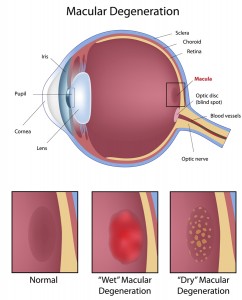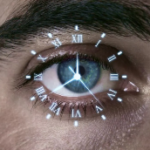Macular Degeneration
About Macular Degeneration
Macular degeneration is a common, painless eye condition in which the central portion of the retina deteriorates and does not function adequately.
About Age-Related Macular Degeneration (AMD)
Although there are many types of macular degeneration, age-related macular degeneration (AMD) is by far the most common type. AMD is a disease associated with aging that gradually destroys sharp central vision that is needed for seeing objects clearly and for daily tasks, such as watching TV, working on a computer, and driving. In some cases, AMD advances so slowly that people notice little change in their vision. In others, the disease progresses faster and may lead to a loss of vision in both eyes. AMD is the leading cause of vision loss in Americans 60 years of age and older.
Risk Factors for Macular Degeneration
Macular degeneration may be passed on from parents to children. If someone in your family has or had the condition, you may be at higher risk for developing macular degeneration.
Smoking, high blood pressure, high cholesterol, obesity, and being Caucasian are also risk factors for macular degeneration of those who experience serious vision loss from the disease.
What is the difference between “wet” and “dry” age-related macular degeneration?
AMD occurs in two forms. “Wet” age-related macular degeneration is less common but more aggressive in its progression to severe central vision loss. “Dry” age-related macular degeneration is the more common type and is more slowly progressive in causing visual loss.

Most patients with macular degeneration have the dry form of the disease and will not lose central vision. However, the dry form of macular degeneration can lead to the wet form. Although only about 10 percent of people with macular degeneration develop the wet form, they make up the majority of those who experience serious vision loss from the disease.
Dry form. The “dry” form of macular degeneration is characterized by the presence of yellow deposits, called drusen, in the macula. A few small drusen may not cause changes in vision; however, as they grow in size and increase in number, they may lead to a dimming or distortion of vision that people find most noticeable when they read. In more advanced stages of dry macular degeneration, there is also a thinning of the light-sensitive layer of cells in the macula leading to atrophy, or tissue death. In the atrophic form of dry macular degeneration, patients may have blind spots in the center of their vision. In the advanced stages, patients lose central vision.
Wet form. The “wet” form of macular degeneration is characterized by the growth of abnormal blood vessels from the choroid underneath the macula. This is called choroidal neovascularization. These blood vessels leak blood and fluid into the retina, causing distortion of vision that makes straight lines look wavy, as well as blind spots and loss of central vision. These abnormal blood vessels eventually scar, leading to permanent loss of central vision.
Treatment for Dry Macular Degeneration
There is currently no treatment available to reverse dry macular degeneration. However, dry macular degeneration is usually slowly progressive and most patients with this condition are able to live relatively normal, productive lives. Often one eye is affected more than the other.
The National Eye Institute’s Age-Related Eye Disease Study (AREDS) found that taking a specific high-dose formulation of antioxidants and zinc significantly reduces the risk of advanced AMD and associated vision loss. Slowing AMD’s progression from the intermediate stage to the advanced stage is helpful in reducing the progression of visual loss in many people.
For more information on eye vitamins click here.
Treatment for Wet Macular Degeneration
There are several courses of treatment available for wet macular degeneration, but the goals is to slow the progression of the disease. The treatments are not cures and in most instances cannot reverse the damages that have already occurred.
Medications may help stop growth of new blood vessels by blocking the effects of growth signals the body sends to generate new blood vessels. These drugs are considered the first-line treatment for all stages of wet macular degeneration.
Next Steps
If you’ve been told you have macular degeneration or think you may have it, it’s important to call us immediately to schedule an appointment. Receiving prompt treatment can be critical to your sight.
Get in touch with us today at our nearest location to you.

